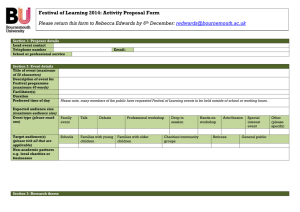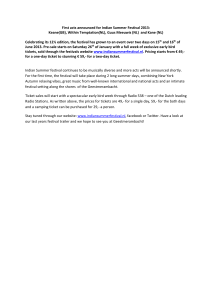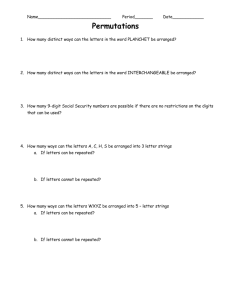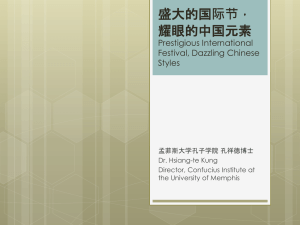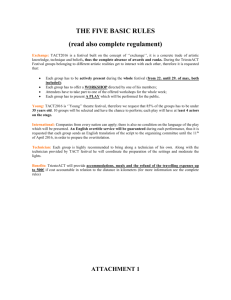All School Patriotic Speech Festival (Handout)
advertisement
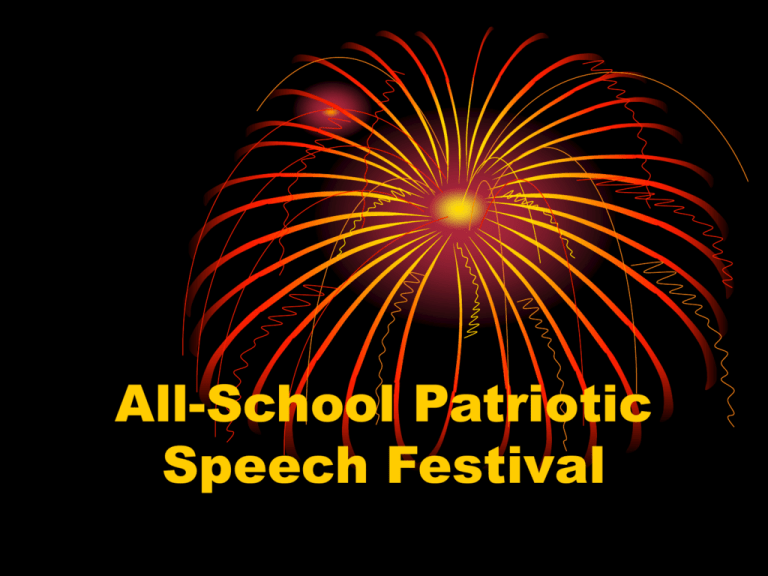
All-School Patriotic Speech Festival Reference Source • Johnson, M. (2003). Primary Sources in the Library: A Collaboration Guide for Library Media Specialists. Worthington, Ohio: Linworth. • Started at Eagleview Middle School, Colorado Springs, CO • All 8th graders participate • Select one piece from any of four categories • Project takes one month • Have students develop your own school list • Can be simplified for elementary school or made more challenging for high school Library Introduction to Historic School Recitation • Use Making of America Web site • Samuel Woodworth’s 1831 book: Melodies, Duets, Trios, Songs, and Ballads, Pastoral Amatory, Sentimental, Patriotic, Religious, and Miscellaneous. Together with Metrical Epistles, Tales, and Recitations. • Study recitation pieces from over 170 years ago. • Go to http://www.hti.umich.edu/m/moagrp • Click on <MoA Books> • Click on <Browse MoA Books> • Click on <W> • Click on <Wo> • Scroll to and click on <Woodworth> • Search for <patriot*> • Click on <results details> • View as <image> and/or • Use American Memory Web site • Read several selections from “Life Histories” on experiences with recitation in schools during the 1930’s • Discuss why memorization is or isn’t useful to students today • Discuss what students might learn from past great orators • • • • Go to http://memory.loc.gov Click on <Collection Finder> Click on <List All Collections> Click on <Life Histories, Federal Writers’ Project> • Click on <Search by Keyword> • Type in <recitation> • Take your pick. “Recitation” is highlighted. Peter A. Gilbert, educator: “It is not great ideas alone that move people’s hearts and minds, but great ideas eloquently expressed. Introduction to Patriotic Speeches • Use U.S. National Archives “Digital Classroom” Web site • Listen to “A Date Which Will Live in Infamy” excerpt • View Roosevelt’s draft • Study new vocabulary • Identify speech techniques: repetition, alliteration, emotionally charged words, appeal to selfpreservation, and assurance of moral superiority Other activities: • Compare Roosevelt’s speech to Patrick Henry’s “Give Me Liberty” speech • Interview elder citizens who actually heard Roosevelt’s speech History Collaboration • Research individual who gave the speech selected • Give students one noncompetition speech without speaker’s name, title, or occasion—Students use clues to guess speaker, time period, issues, vocabulary meanings, possible audience, etc. • Research era of chosen speech English Collaboration • Students each analyze selected speech, using form • Whole class writes 5-paragraph essay on same non-competition speech • Then each student writes 5paragraph essay on own selected speech Other Collaboration • Drama: Work on historic oratorical style • Drama and Art: Help with costumes for Festival • Art: Plan and prepare Festival decorations (lots of flags and bunting) • Cooking: Study and prepare “historic” recipes for Festival refreshments Still more: • Music: Choose and practice patriotic songs for audience Sing-Along at Festival • Technology: Prepare PowerPoint of song lyrics • Parents’ club: Possible source of refreshments and prizes • Community groups: Judges, prizes, publicity Competition • Everyone presents in class (receive judging form in advance) • Top # in each category compete in Semi-Finals • Top Semi-Final Winners present at Festival Finals • Over-all champion is named Possible Judges • • • • • • • • • School board members District administrators City council members, legislators Professors of English or speech Active or retired military personnel War veterans, medal winners Former POW-MIAs Police or fire fighters Community activists Festival! • • • • Pledge and national anthem Sing-Along Speeches by Finalists Exhibition pieces by rest of class members before, between and after Finalists • Sing-Along during judging computation • Awards ceremony • Refreshments!!!

